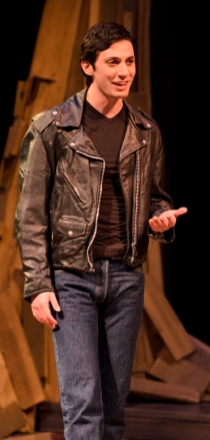
Dan Rubens
Cloud Nine
Churchill
U of Michigan-Ann Arbor
2012
Cloud Nine
University of Michigan — Ann Arbor, 2012Jenn McKee – Ann Arbor News
If nothing else, Caryl Churchill’s play Cloud Nine—now being staged by the University of Michigan theater department—powerfully reminds us that humans fare best when provided with at least a modicum of structure. When there are too many rules and constraints, we feel suffocated; and conversely, when there are no rules, we feel unmoored and paralyzed by indecision.
Churchill examines this and more in a play that’s unlike anything you’ve seen before. With gender- and race-bending casting (per Churchill’s script instructions), and set in 1880 Africa, Cloud Nine’s first act focuses on an expatriate family that’s chafing against Victorian England’s strict sexual codes. Patriarch Clive (Neal Kelley) has set his sights on the local widow, Mrs. Saunders (Carrie Royce Fisk); Clive’s wife Betty (Andrew Whipple) and his doll-loving son Edward (Emma Berdie Donson) both yearn for a visiting explorer, Harry (Kris Reilly), who engages with them as well as with the black servant, Joshua (Dan Rubens); and the children’s governess, Ellen (Fisk) desires Betty.
The second act, meanwhile, is set in London in 1980, but the family members have only aged about 25 years, and the production’s actors switch roles. Now Victoria (Fisk)—a 2-year-old “played” by a doll in the first act—is grown, with a husband (Reilly) and a son, but she’s also pursuing a lesbian relationship with Lin (Emily Berman), who has a young daughter (Kelley). Edward (Whipple) is gay, but open to anything that might fulfill him. (Cloud is definitely for mature audiences.)
Churchill doesn’t take these artistic risks lightly—there’s thought and purpose behind each choice—but that’s not to say the play is the least bit dry or unfunny. Quite the opposite. Churchill makes her points as much through the dialogue’s wit and humor as she does through unconventional casting.
For part of Churchill’s aim is to demonstrate how self-absorbed and hypocritical we can be in the face of both oppression and freedom. In Act Two, for instance, Victoria’s husband says to her, “Do you know how insulting it is to me that you can’t pull yourself together?”
Director Tim Ocel does a terrific job setting just the right tone, which is tricky: You don’t want to be too broad with the comedy, but you don’t want to suck the playful, whimsical sense of fun from the piece, either, while also allowing its more serious moments to land and resonate. (The last moment in particular is a surprisingly emotional knockout.)
Of course, the actors were tested by having to switch roles midstream, but they all passed with flying colors. Two of opening night’s most noteworthy dual performances came from Kelley and Donson. Kelley shifted from entitled colonialist to erratic, petulant young girl with impressive ease while getting lots of laughs; and Donson morphed from an ashamed, confused young boy to a aging, wistful woman in a way that inspired close analysis of the characters’ similarities.
Catherine Cornell’s set design places Cloud Nine’s action on a large Union Jack floor; Rachel Laritz’s marvelous costume design, paired with Dawn Rivard’s wig and makeup design, helps achieve the play’s gender- and race-bending “illusion”; Rachael D. Albert’s lighting design subtly underlines the play’s changing moods; and sound designer Henry Reynolds provides a musical backdrop that plays on the title while staying consistent with the production’s tone.
With a run time of two and a half hours, the play sometimes feels long; yet because the world of Cloud 9 is both familiar and off-kilter at the same time, this sense of always being unsettled is unquestionably part of its charm and appeal.
Back to Cloud Nine Press...Back to Educational Theatre Resume...

